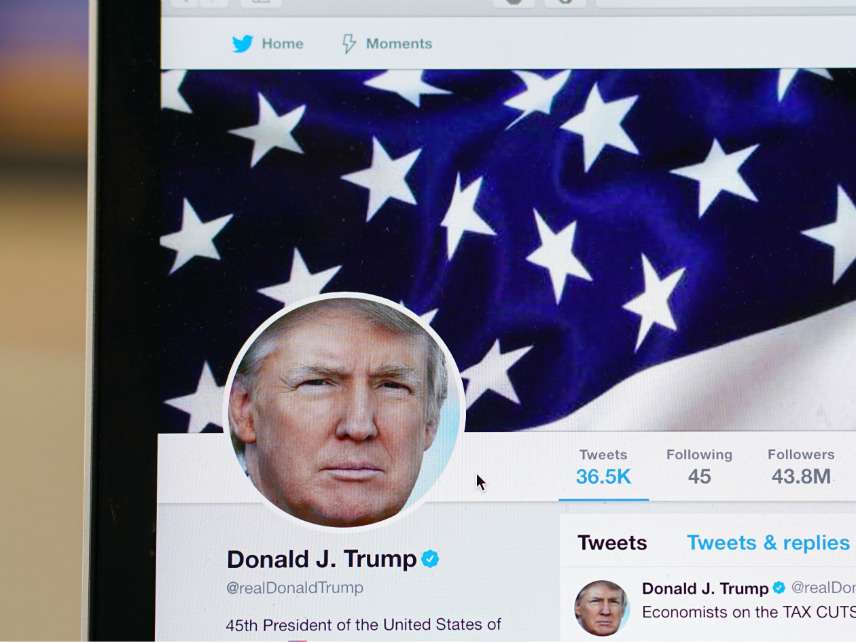Is It Really Illegal for Trump to Block People on Twitter Now?
Federal judge rules that the First Amendment prohibits the president from blocking followers based on their political views.

The First Amendment prohibits President Trump from using his personal Twitter account to block critics, a federal judge in Manhattan ruled today.
U.S. District Judge Naomi Reice Buchwald, a Clinton appointee, said that Trump's occasional use of Twitter's blocking feature violates his critics' rights to free speech. "The blocking of the individual plaintiffs as a result of the political views they have expressed is impermissible under the First Amendment," Buchwald wrote.
It's a somewhat bizarre decision: The plaintiffs, represented by Columbia University's Knight First Amendment Institute, are complaining about being blocked from following and interacting with Trump's personal @realDonaldTrump account. They did not allege that the president—or anyone else in his administration—has prevented them from following actual official U.S. government accounts such as @POTUS, @PressSec, or @WhiteHouse.
It seems clear that @realDonaldTrump is a primarily a personal account. He created it eight years before taking office. He now uses it for non-governmental campaign purposes, such as urging people to vote for certain state politicians. He also uses it to complain about witch hunts, John Kerry, fake news, and of course the White House Correspondents' Dinner—not one of which is an official position of the U.S. government.
But to rule in favor of the plaintiffs, Buchwald had to find a way to declare @realDonaldTrump to be an official government account. Her logic was this: "Because the President and [White House Director of Social Media Dan Scavino] use the @realDonaldTrump account for governmental functions, the control they exercise over it is accordingly governmental in nature…While we must recognize, and are sensitive to, the President's personal First Amendment rights, he cannot exercise those rights in a way that infringes the corresponding First Amendment rights of those who have criticized him."
The judge's logic turns the traditional way of viewing the First Amendment on its head: Your right to free speech doesn't extend to a right to make someone else, even a politician you have good reason to loathe, listen to you. The Supreme Court expanded on this in a 1984 case, ruling that a "person's right to speak is not infringed when government simply ignores that person while listening to others."
In other words, being ignored may hurt your feelings or make you feel sad, but it does not necessarily rise to the level of a violation of the U.S. Constitution.
If a senator happened to be in a public park and chose not to engage with protesters, or ducked some overly enthusiastic supporters, that would be perfectly consistent with the First Amendment. Any decision not to engage may naturally disappoint someone—and perhaps that senator will pay some political price at the next election.
But what does not infringe upon a voter's free speech rights in a public park does not, or at least should not, on Twitter either. Both are examples of exercising the equally important right to associate, or not to associate, with other individuals or groups.
Another argument against the plaintiffs, which the U.S. Justice Department will surely make on appeal, is that it's trivial to see @realDonaldTrump's tweets even if you're blocked. Simply log out of Twitter. Or use your web browser's incognito mode. This won't allow plaintiffs to participate in @realDonaldTrump's discussion threads, but it will trivially allow them to read what the president is tweeting from his personal account.
It's true that in some cases the government can use private property to establish a limited public forum that would be regulated by the First Amendment. If a town government rents a meeting room from a nearby hotel, and lets the public speak during a comment period (as my local town council does), it likely could not impose viewpoint-based restrictions on the public. But a member of the town council, who rents the same room the next day for his own private purposes, has the right to arbitrarily exclude any member of the public for any reason. That's a lot closer to what Trump is doing on Twitter.
If Buchwald's decision is upheld on appeal, it will impact Democratic as well as Republican politicians. Twitter-blocking apparently has become a bipartisan pastime. A ProPublica article last year reported that people across the country "have been cut off by elected officials at all levels of government after voicing dissent on social media." Atlanta mayor Kasim Reed, a Democrat who left office earlier this year, blocked not only critics but journalists too; a local newspaper kept a running total. And what about Ivanka?
For now, at least, Buchwald declined to issue an injunction that would attempt to compel Trump to unblock the plaintiffs immediately. (Using Twitter's mute feature apparently remains an option for the president.)
In her opinion today, she wrote: "Though we conclude that injunctive relief may be awarded in this case…we decline to do so at this time because declaratory relief is likely to achieve the same purpose…Because no government official is above the law and because all government officials are presumed to follow the law once the judiciary has said what the law is, we must assume that the President and Scavino will remedy the blocking we have held to be unconstitutional."
There's been no response yet from @realDonaldTrump.
